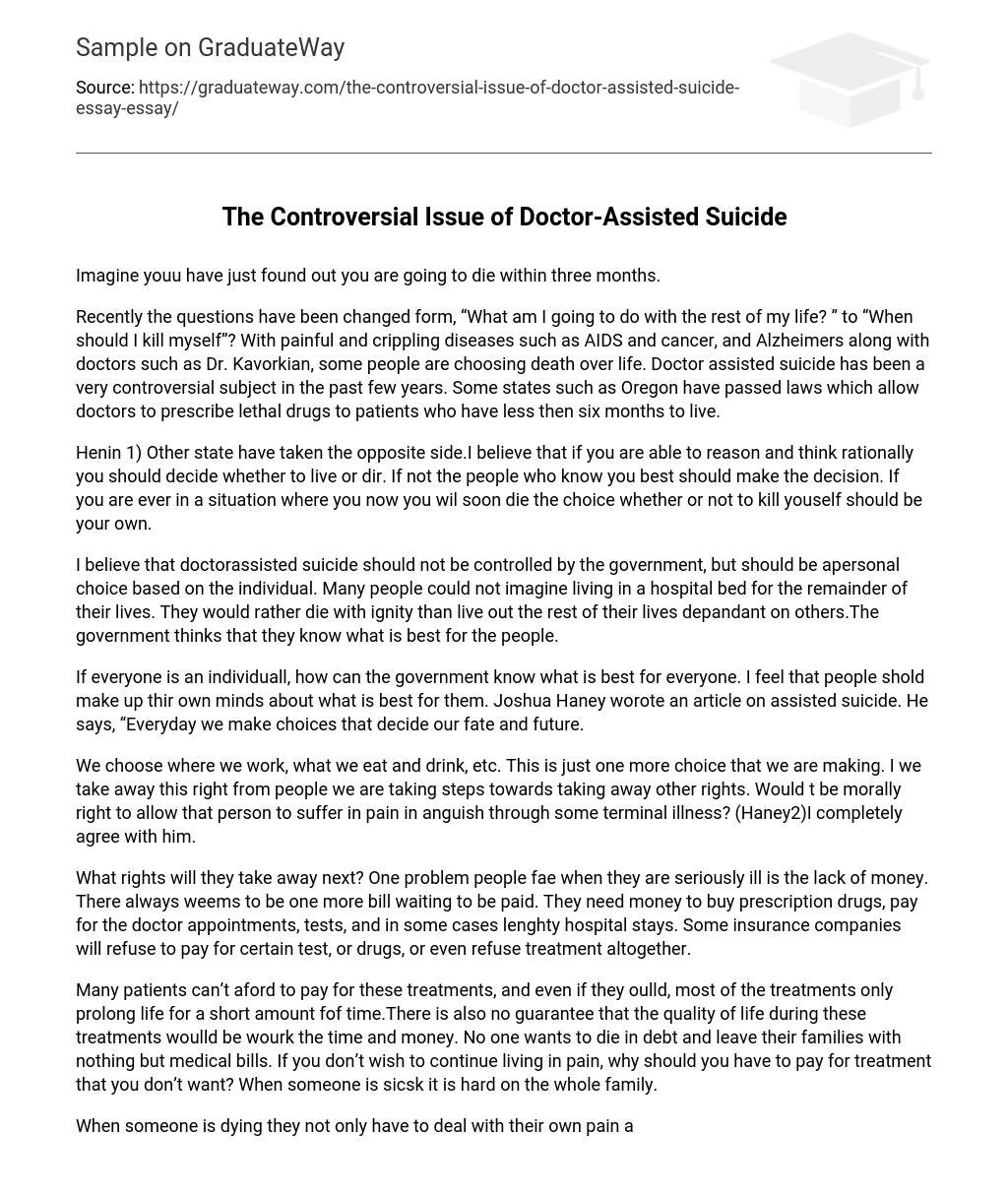If you find yourself in a situation where you have recently learned that your life will end within the next three months, take a moment to reflect.
Recently, there has been a shift in perspective from pondering “What should I do for the remainder of my life?” to contemplating “When is it suitable to terminate my life?”. This shift can be attributed to the existence of excruciating and incapacitating diseases such as AIDS, cancer, and Alzheimer’s, along with the rise of doctors like Dr. Kavorkian who endorse assisted suicide. The ethical aspect surrounding physician-assisted suicide has recently sparked significant controversy. Certain states, including Oregon, have enacted legislation that allows doctors to prescribe lethal medications to patients projected to live less than six months.
Henin 1) The issue of individuals having the authority to decide whether they want to continue living or not is a subject that elicits varying opinions among states. In my perspective, those who possess reasoning and logical thinking abilities should be granted the power to make this determination. However, in cases where someone lacks the capacity to make such a decision, their close acquaintances should have the ability to do so on their behalf. When confronted with an unavoidable situation leading to death, it is essential that the ultimate decision of terminating one’s own life rests solely with the individual.
Personally, I oppose government regulation of doctor-assisted suicide since it is a personal decision that individuals should be able to make autonomously. Many people find the prospect of being confined to a hospital bed for the rest of their lives intolerable and would rather choose to die with dignity on their own terms. Unfortunately, the government believes it has the authority to determine what is in the best interest of its citizens.
If the government lacks knowledge about individual preferences, people should have the freedom to determine their own ideals. Joshua Haney discusses this concept in his article on assisted suicide, emphasizing how our daily decisions shape our future and possibilities.
We have the freedom to make choices in different aspects of our lives, including work and what we consume. This includes the right to use our own judgment when making decisions. Taking away this privilege from people would also undermine other rights. It would be morally unfair to impose a terminal illness on someone. I completely agree with Haney2’s viewpoint.
What other rights will they strip away? The struggle individuals battling serious illnesses face revolves around financial constraints. There always appears to be an additional bill awaiting payment. Financial resources are necessary to purchase prescription medications, cover medical appointments, tests, and on occasion, prolonged hospital stays. Certain insurance companies may deny coverage for specific tests or drugs, or even decline treatment entirely.
Many patients cannot afford the cost of these treatments, and even if they can, most of them only offer a temporary extension of life. Additionally, there is no assurance that the quality of life during these treatments would justify the time and money spent. No one wants to leave their families burdened with medical expenses while dying in debt. If you no longer wish to suffer, it is unfair to be required to pay for an unwanted treatment. Illnesses present challenges for the whole family.
As individuals approach the end of their life, they face not only their own physical and mental suffering but also witness the distress endured by their loved ones. This can cause them to view themselves as a burden and feel guilt and sadness. As a result, some may choose suicide. Although I do not support suicide in all cases, I do think it should be contemplated as an option for those enduring an incurable physical illness or who see no hope for a cure in the near future.
I support the idea that individuals should have the freedom to choose whether they receive assistance in ending their lives. It is unjust for both governmental authorities and protestors to impose their own beliefs on others without considering personal wishes. While some argue that it is cruel for doctors to support assisted suicide, I share A. Wilkie Kushner’s perspective that death is a common experience among all humans.
According to Kushner (3), having control over the timing and manner of one’s death is a basic right. Death, being an inevitable part of life, warrants individuals to make decisions regarding it. If someone is incapable of making this decision, it should be permissible for their loved ones to provide assistance. However, it is perplexing that hospitals focus more on prolonging life through medical interventions and medications rather than offering adequate support to those desiring a peaceful passage. In such instances, compassion appears to be deficient.





